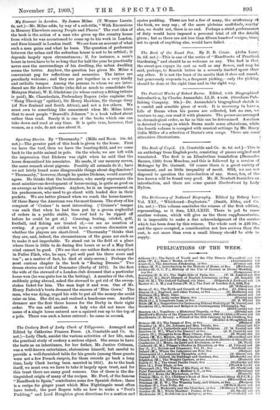Sporting Stories. By " Thormanby." (Mills and Boon. 10s. 6d.
net.)—The greater part of this book is given to the horse. First we have the turf, then we have the hunting-field, and we come back to the noble animal in polo. On the whole, we are left with the impression that Dickens was right when he said that the horse demoralised his associates. He made, if our memory serves, the same remark about pigeons. Possibly all animals do it; have we not lately heard some disagreeable things about dog-fanciers ? " Thormanby," however, though he quotes Dickens, would scarcely agree. He thinks that the bookmaker, who surely represents the most mischievous development of horse-racing, is quite as good on an average as his neighbours. Anyhow, he is an improvement on his predecessors, who used to go about with loaded dice in their pockets. We are better pleased when we reach the horse-tamers. Of these Rarey the American was the most famous. The story of his conquest of ' Cruiser' is most interesting. (' Cruiser's' temper was such that when he had been put by a groom neglectful of orders in a public stable, the roof had to be ripped off before he could be got at.) Coursing, boxing, cricket, golf, football, and fishing are treated of,—we see no mention of rowing. A propos of cricket we have a curious discussion on whether the players are short-lived. " Thormanby " thinks that they are, and, indeed, the circumstances of the game are such as to make it not improbable. To stand out in the field at a place where there is little to do during five hours or so of a May East wind cannot be good. (We see that our author finds an exception in Fuller Pilch, who, he says, "got well past his three score and ten"; as a matter of fact, he died at sixty-seven.) Perhaps the most curious chapter in the book is "Racing Dreams." Two dream stories are told of Doncaster (Derby of 1873). In the first the wife of the steward of a London club dreamed that a particular horse won (he was quite low in the betting). A member of the club, suddenly going abroad, asked the steward to get rid of the sweep- stakes ticket for him. The man kept it and won. One of Mr. Henry Padwick's touts dreamed the success of ' Blue Gown. The man, who was dying, urged his wife to put all the money she could raise on him. She did so, and realised a handsome sum. Another dreamer saw the first three horses for the Derby in their right order. We can add another. A lady who did not know the name of a single horse entered saw a squirrel run up to the top of a pole. There was such a horse entered : he came in second.














































 Previous page
Previous page